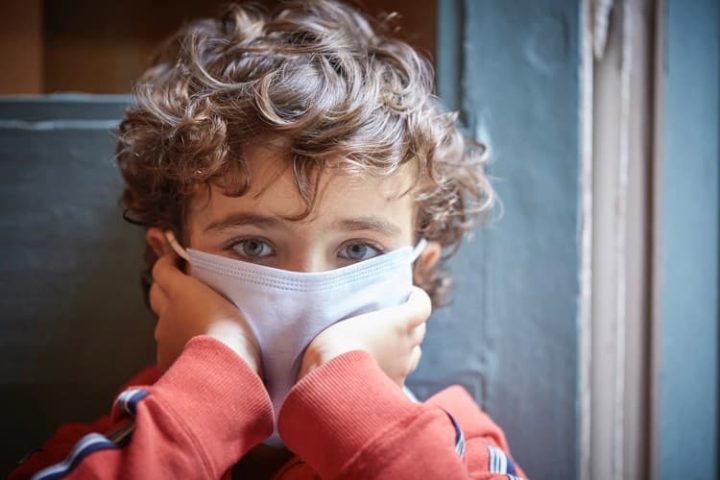
“The typical mask you buy in the drug store is not really effective in keeping out virus, which is small enough to pass through the material.” So said Dr. Anthony Fauci, head of the National Institute of Allergy and Infectious Diseases (NIAID), in a February 5 e-mail. It’s just one of the many indications that widespread masking is more COVID Ritual than science. What’s more, an Irish study cited on Fox News Thursday night has found that it isn’t just that masking schoolchildren is useless — it’s actually dangerous to their health.
It’s not as if this is the first masking red flag we’ve gotten. Past studies have found that masks become as pathogen-laden Petri dishes on people’s faces, that they can restrict oxygen intake and induce dangerously high carbon dioxide levels in children’s bloodstreams, and that wearers may be inhaling unhealthful plastic microparticles from them. Despite this and ostensibly motivated by the COVID-19 Delta variant’s prevalence, the Centers for Disease Control and Prevention (CDC) is recommending that our country’s 56 million children and teens wear masks regardless of vaccination status, their communities’ infection levels, and even though children aren’t generally threatened by, and don’t seem to readily transmit, the virus.
Of course, the CDC has flip-flopped on masks more than once, following the lead of Fauci, who changes COVID positions like clothes. Yet even if you believe CDC 5.0 and Fauci 9.0 (unless I missed a few iterations) and reckon that masking reduces contagion, a simple rule must be remembered.
To wit: It’s easy to make a case for something, anything, if you only look at the proposition’s pros and ignore the cons.
But in a recent Wall Street Journal piece, Johns Hopkins School of Medicine professor Dr. Marty Makary and Dr. H. Cody Meissner, chief of pediatric infectious diseases at Tufts Children’s Hospital, examined those cons. Citing, among other things, the aforementioned Irish study, they write:
Some children are fine wearing a mask, but others struggle. Those who have myopia can have difficulty seeing because the mask fogs their glasses. (This has long been a problem for medical students in the operating room.) Masks can cause severe acne and other skin problems. The discomfort of a mask distracts some children from learning. By increasing airway resistance during exhalation, masks can lead to increased levels of carbon dioxide in the blood. And masks can be vectors for pathogens if they become moist or are used for too long.
In March, Ireland’s Department of Health announced that it won’t require masks in schools because they “may exacerbate anxiety or breathing difficulties for some students.” Some children compensate for such difficulties by breathing through their mouths. Chronic and prolonged mouth breathing can alter facial development. It is well-documented that children who mouth-breathe because adenoids block their nasal airways can develop a mouth deformity and elongated face.
Thursday night, Fox News host Tucker Carlson reported on the Irish study as well and based on its findings characterized the masking of children as “child abuse” (video below).
Makary and Meissner also address something I’ve warned of in the past: masking’s psychological effects. They write:
The possible psychological harm of widespread masking is an even greater worry. Facial expressions are integral to human connection, particularly for young children, who are only learning how to signal fear, confusion and happiness. Covering a child’s face mutes these nonverbal forms of communication and can result in robotic and emotionless interactions, anxiety and depression. Seeing people speak is a building block of phonetic development. It is especially important for children with disabilities such as hearing impairment.
The two physicians conclude that while the negative effects of a few weeks’ masking are likely minor, they “can’t say that with any confidence when the practice stretches on for months or years.”
The question is, however: Why even take the chance when there’s no apparent upside to justify the risk?
Makary and Meissner mention that kids transmit the coronavirus far less readily than do adults, citing a North Carolina study of 90,000 students that found not one solitary case of child-to-teacher transmission. Moreover, “the evidence establishing the efficacy of masking is, at best, mixed,” reports The Patriot Post’s Mark Alexander. He continues:
Recently, our Emmy Griffin wrote on the subject of masking efficacy, questioning, amid all the rush to re-mask, whether the masks 99.9% of Americans are using actually work.
Fact is, based on a review of 14 key randomized controlled tests on masking, the evidence indicates that “three [of the studies] suggest, but do not provide any statistically significant evidence in intention-to-treat analysis, that masks might be useful.” However, the researchers conclude, “The other eleven suggest that masks are either useless — whether compared with no masks or because they appear not to add to good hand hygiene alone — or actually counterproductive.”
To add perspective here, I’ll make a point I often have. That is, we shouldn’t simply ask how effective the masking prescription is if a hypothetical person (responsible) wears a hypothetical mask (N95) maintained and worn in a hypothetical way (disinfected and properly fitted), but: How will the general population apply the recommendation?
Answer: They’ll typically wear the wrong masks, the wrong way, with the wrong hygiene.
Makary and Meissner opine likewise, writing, “Cloth masks aren’t nearly as effective as N95 respirators, but the CDC directives ignore the distinction.”
Senator Rand Paul (R-Ky.), who’s also a physician, was even more definitive. “Most of the masks you get over the counter don’t work; they don’t prevent infection,” he recently stated. “Saying cloth masks work when they don’t actually risk[s] lives, as someone may choose to care for a loved one with COVID while only wearing a cloth mask. This is not only bad advice but also potentially deadly information.”
Yet for thus opining — and mirroring Fauci’s February 5 comments — on YouTube, Paul was suspended by the tech giant.
Alexander points out that such censorship, par for the course today, along with the continual flip-flopping, dissembling, and goalpost-shifting by health officials such as Fauci, have largely undermined confidence in the government’s SARS-CoV-2 response. After all, when someone advances his position by habitually lying and stifling debate, do you assume he has the Truth on his side?



